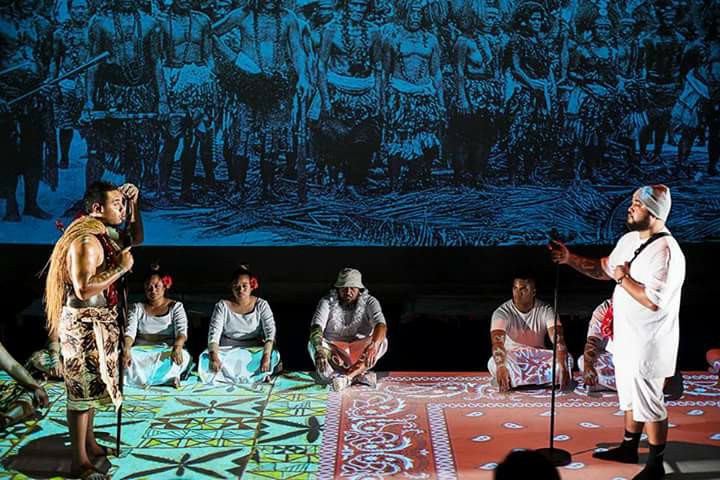The ‘Plastic’ Islander debate – it’s old, move forward

By Lefaoali’i Dion Enari
* Cover image '4 tha Lumana'i' by Raymond Sagapolutele
As a Samoan Researcher, looking at the ‘plastic’ islander debate, I have seen it all. From those who are trying to learn their Pacific languages and cultures for the first time, to those who were raised as fluent speakers, and all in-between. I have seen both sides of this story; from the diaspora born being teased by Island born, for not knowing their mother tongue; to Island born, being made fun of by their NZ, Australian and American born cousins for having ‘broken’ English. Growing up, some of us were not taught our Pacific languages, out of fear it would negatively affect our position in the palagi world. There were also those who were taught our mother tongue, as they were constantly around other Pacific people.

As we see the term ‘plastic’ islander, most of us have our own personal stories of being attacked, comforted or challenged for our beliefs. As I continue to see our people debate over what a ‘real’ islander is, I am both excited and exhausted. I say excited, because these debates have allowed people to express their views and feelings on identity. I also say exhausted; because these debates have been long ongoing, well before my time (my NZ born uncles had these same debates in the 1970’s).
As I look at this issue and all the different perspectives I have heard, I believe Maualaivao Emertius Professor Albert Wendt said it best, when he said
“If you feel Samoan, and you have some genealogical connection, you are Samoan”.
This sentence by Maualaivao is important, as it highlights the obvious; ancestral links and blood line makes you a son and daughter of the Pacific.
As an advocate, I believe our conversations must move forward from debating who is ‘Pacific’, ‘Samoan’ and ‘Tongan’ with a focus on how we ensure the survival of our languages and culture. I say this because while we have been engaging in the ‘plastic’ islander debate, many of our languages have been on the decline. Several Pacific languages such as Niuean and Tuvaluan are now on the UN (United Nations) list of endangered languages. Research has also shown that without deliberate effort, our Pacific languages could be completely lost by the next generation. A complete loss of our language is scary; there will be many downfalls if this occurs, such as a loss of identity, wisdom and cultural legacy.

We can’t change the past, but we can change the present and future. Luckily, we have the internet, parents, grandparents, cousins, uncles and aunties (even the ones you avoid), that are able to help in the journey of (re)claiming our culture and languages. We must work together, as we all have a part to play, either as teachers, learners and guardians of our measina (treasure).
We are tomorrow’s ancestors. We decide how our languages and cultures will move forward into the future. It is my humble prayer that for some, this article sparks a burning flame of (re)claiming our cultural inheritance, whilst for others, it further encourages the important work they already do. Ia manuia le aso.
.
Lefaoali’i Dion Enari is a PhD Candidate at the Faculty of Society and Design, Bond University, Gold Coast. He holds a Master of International Relations and Ali’i Tulafale Matai (high talking Chief) title from Lepa, Samoa. His research interests include mental health, ethnography, Pacific language, cultural sustainability, Indigenous studies, and trans-nationalism.
He is from the villages of Lepa, Malaela, Vaiala, Nofoali’i and Safune.
